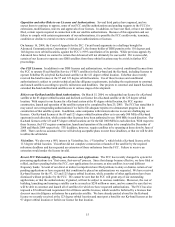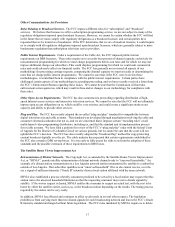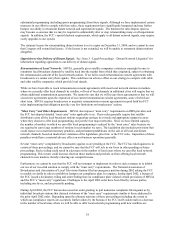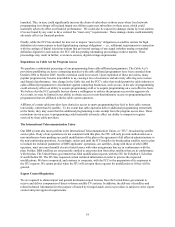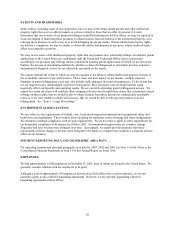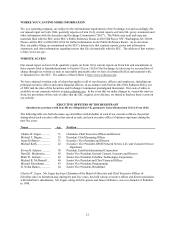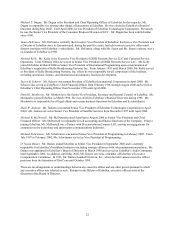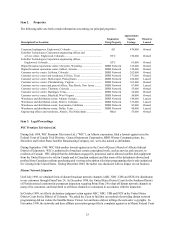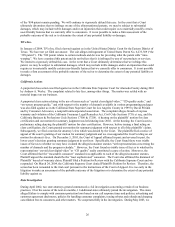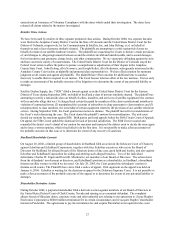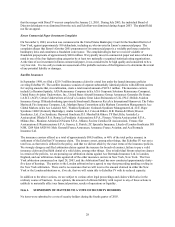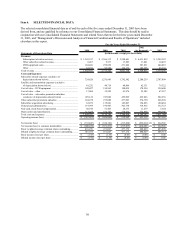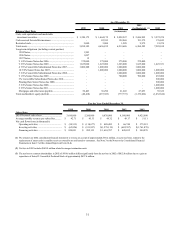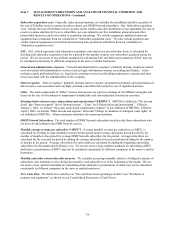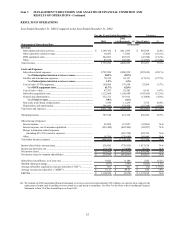Dish Network 2003 Annual Report Download - page 30
Download and view the complete annual report
Please find page 30 of the 2003 Dish Network annual report below. You can navigate through the pages in the report by either clicking on the pages listed below, or by using the keyword search tool below to find specific information within the annual report.25
Gemstar
During October 2000, Starsight Telecast, Inc., a subsidiary of Gemstar-TV Guide International, Inc. (“Gemstar”), filed
a suit for patent infringement against us and certain of our subsidiaries in the United States District Court for the
Western District of North Carolina, Asheville Division. The suit alleges infringement of United States Patent No.
4,706,121 (“the ‘121 Patent”) which relates to certain electronic program guide functions.
In December 2000, we filed suit against Gemstar-TV Guide (and certain of its subsidiaries) in the United States District
Court for the District of Colorado alleging violations by Gemstar of various federal and state anti-trust laws and laws
governing unfair competition. Gemstar filed counterclaims alleging infringement of United States Patent Nos.
5,923,362 and 5,684,525 that relate to certain electronic program guide functions. In addition, Gemstar asserted new
patent infringement counterclaims regarding United States Patent Nos. 4,908,713 and 5,915,068. These patents relate
to on-screen programming of VCRs.
In February 2001, Gemstar filed patent infringement actions against us in the District Court in Atlanta, Georgia and
with the ITC. These suits allege infringement of United States Patent Nos. 5,252,066, 5,479,268 and 5,809,204, all
of which relate to certain electronic program guide functions. In addition, the ITC action alleged infringement of the
‘121 Patent which was also asserted in the North Carolina case previously discussed. On March 1, 2004, we entered
into a number of agreements with Gemstar including a settlement agreement which provides for the resolution of the
aforementioned disputes between us and Gemstar. The effectiveness of the settlement is subject to certain
conditions, including the previously discussed closing of the SNG sale.
During 2000, Superguide Corp. (“Superguide”) also filed suit against us, DirecTV and others in the United States
District Court for the Western District of North Carolina, Asheville Division, alleging infringement of United States
Patent Nos. 5,038,211, 5,293,357 and 4,751,578 which relate to certain electronic program guide functions, including
the use of electronic program guides to control VCRs. Superguide sought injunctive and declaratory relief and
damages in an unspecified amount. It is our understanding that these patents may be licensed by Superguide to
Gemstar. Gemstar was added as a party to this case and asserted these patents against us. We examined these patents
and believe that they are not infringed by any of our products or services. A Markman ruling interpreting the patent
claims was issued by the Court and in response to that ruling, we filed motions for summary judgment of non-
infringement for each of the asserted patents. Gemstar filed a motion for summary judgment of infringement with
respect to one of the patents. During July 2002, the Court issued a Memorandum of Opinion on the summary judgment
motions. In its Opinion, the Court ruled that none of our products infringe the 5,038,211 and 5,293,357 patents. With
respect to the 4,751,578 patent, the Court ruled that none of our current products infringed that patent and asked for
additional information before it could rule on certain low-volume products that are no longer in production. During
July 2002, the Court summarily ruled that the aforementioned low-volume products did not infringe any of the asserted
patents. Accordingly, the Court dismissed the case and awarded us our court costs and the case was appealed to the
United States Court of Appeals for the Federal Circuit. On February 12, 2004, the Federal Circuit affirmed in part and
reversed in part the District Court’s findings and remanded the case back to the District Court for further proceedings.
We will continue to vigorously defend this case. In the event that a Court ultimately determines that we infringe on any
of the aforementioned patents, we may be subject to substantial damages, which may include treble damages and/or an
injunction that could require us to materially modify certain user-friendly electronic programming guide and related
features that we currently offer to consumers. It is not possible to make a firm assessment of the probable outcome of
the suit or to determine the extent of any potential liability or damages.
Broadcast Innovation, LLC
In November of 2001, Broadcast Innovation, LLC filed a lawsuit against EchoStar, DirecTV, Thomson Consumer
Electronics and others in Federal District Court in Denver, Colorado. The suit alleges infringement of United States
Patent Nos. 6,076,094 (“the ‘094 patent”) and 4,992,066 (“the ‘066 patent”). The ‘094 patent relates to certain
methods and devices for transmitting and receiving data along with specific formatting information for the data.
The ‘066 patent relates to certain methods and devices for providing the scrambling circuitry for a pay television
system on removable cards. We examined these patents and believe that they are not infringed by any of our
products or services. Subsequently, DirecTV and Thomson settled with Broadcast Innovation leaving EchoStar as
the only defendant. On January 23, 2004, the judge issued an order finding the ‘066 patent invalid as being
indefinite in violation of 35 U.S.C. Sec. 112. Motions with respect to the infringement, invalidity and construction


